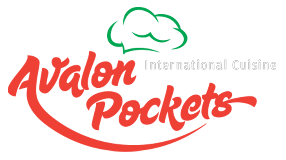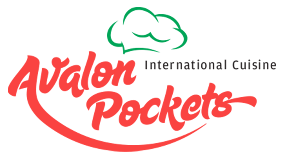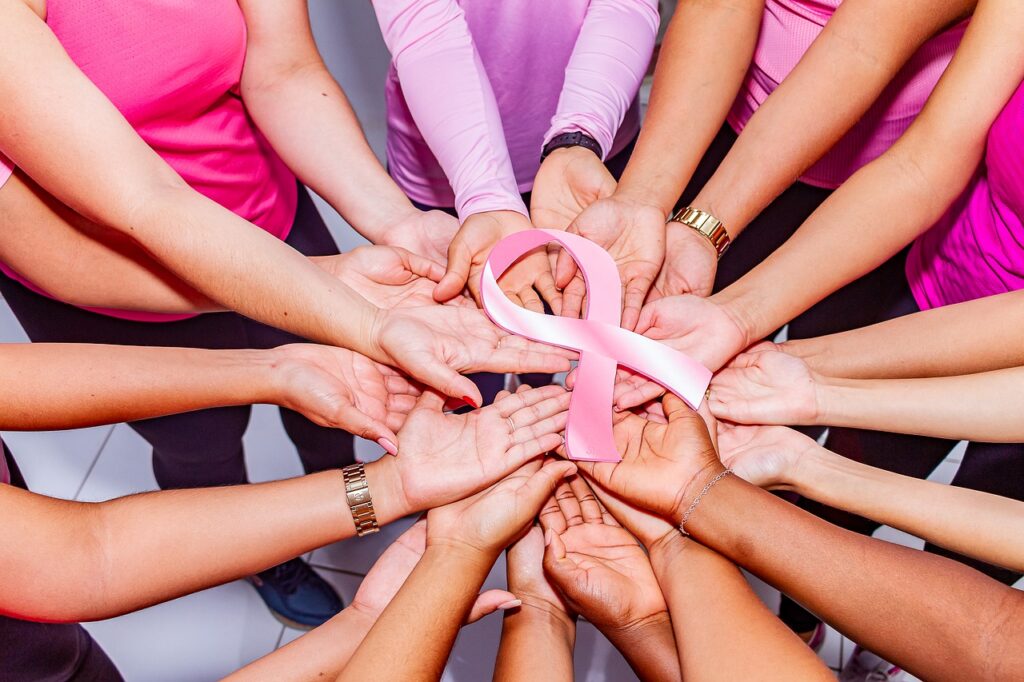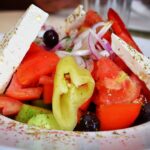Several new medical research studies suggest a beneficial link between breast cancer and the Mediterranean diet.
A large percentage of women and some men suffer from breast cancer and tens of thousands of them die each year. It’s sad to know that we lose loved ones for such a petty reason and medical technology as it seems has not yet advanced enough to solve this problem. While scientists all over the world scour the data they’ve collected about breast cancer and look for ways to prevent and/or cure it, Nature already has the answer. Many researchers think that there’s a connection between breast cancer and the Mediterranean diet. Their findings seem to point to the healing properties of the Mediterranean diet and that it can also prevent breast cancer.
Studies on Breast Cancer and the Mediterranean Diet
Modern medicine has tended to recommend a pill for every ill; however, a growing number of medical professionals and scientists – with their own peer-reviewed journals to back up their claim – are contending that food may already have the potent ingredients to prevent (and maybe even cure) most life-threatening ailments such as heart disease, diabetes and cancer.
I think the phrase “prevention is better than cure” is all too well known to us all. The researchers at the Viridian Nutrition have pointed out evidence on how by simply modifying your diet and lifestyle can have a positive impact in your health.
Since the 1990s the incidence rates of breast cancer have risen by approximately 13% in the United States and in the UK it’s even higher at 19%, and it is estimated that 44,130 deaths (43,600 women and 530 men) from breast cancer will occur this year according to Cancer.net. The risk factors associated with breast cancer are narrowed down to genetics, environmental factors, endocrine hormones and menopausal status. While it’s true that these factors will be unavoidable as any person goes through their lives, researchers are beginning to see a familiar pattern in an individual’s diet and how it can become the precursor to breast cancer. Researchers are hoping to use this data and develop an adjustable lifestyle component to help significantly reduce risk of developing this illness.
But we here at Avalon Pockets already know that certain foods can prevent breast cancer and the Mediterranean diet is one of the eating patterns that proves this claim.
Scientists looked at Western diet and noted that perhaps due to it being rich in dairy, processed meats and refined sugars creates the necessary atmosphere where cancer cells can develop and thrive. However, the scientists also admit that they do not yet have enough data to prove this assessment beyond any doubt. On the other hand, epidemiological studies have identified a risk-reducing effect for those following a healthy balanced diet, this goes without saying that there are health benefits between breast cancer and the Mediterranean diet that will cancel the former with the kind of nutrients the latter provides.
Following a Mediterranean Diet
In 2014 an observational study was done to determine the nutritional value of a Westernized diet and what they found stun them. Their data showed that the typical American diet had a hand in a higher risk of developing or progressing breast cancer. They also found that women had a 56% lower risk (higher quartile of consumption) of developing breast cancer and the Mediterranean diet, which is the diet pattern that they’ve adopted, is primarily responsible for it. This has a stronger protective effect for those who consume more Mediterranean recipes, which is at 68 percent.
Now the reason why the Mediterranean diet is such a popular eating pattern for dieticians and other medical professionals is because of the kinds of ingredients it recommends people to include in its recipes. Foods like high quality fresh fruit and vegetables, fish, olive oil, legumes, nuts and seeds and garlic are just among the few items in this diet. Its advise to drink wine occasionally, eating red meat once or twice a month (preferably less than that amount), and no dairy consumption can improve one’s health significantly. It’s the reason why people who adhere to this diet are so healthy and you’ll rarely see any of the women are at high risk or have developed breast cancer and the Mediterranean diet as well as their Mediterranean lifestyle is purely responsible for it.
A Spanish intervention investigated the effects of women following either a Mediterranean diet was conducted in 2015. The diet was supplemented with either an additional EVOO (extra virgin olive oil), legumes and nuts, or a control low fat diet, which have put the diet to the test.
The data from this long-term randomized test that lasted for 4 years indicates:
- The women who adhered to the Mediterranean diet supplemented with EVOO had a 62% relatively lower risk of breast cancer incidence, compared to the standard Westernized or controlled diet.
- The ones who consumed Mediterranean diet recipes and adding legumes and nuts to that diet showed no significant risk reduction to breast cancer.
- A combined 51% of relative risk on developing breast cancer and the Mediterranean diet plus the 2 additional supplements has proved this evidence.
The study discovered that a higher consumption of EVOO – which also provides less than 15% of the total energy intake – might be the key to reducing the risk of developing breast cancer risk significantly. Olive oil is rich in polyphenols and in other research this naturally occurring organic compound has shown to have powerful antioxidant properties.
Additional research that looked into how the Mediterranean diet can prevent breast cancer re-occurrence yielded good results. Several women who had previously been treated for early breast cancer were told to undergo a full medical checkup to see if there are any signs of relapse (they have been following the Mediterranean diet since their treatment too), and researchers were surprised to find that none of them had any relapses. Unfortunately, around 11 patients who followed the standard diet had a breast cancer recurrence, the study finds, while in the Mediterranean diet group there were none.
Recommended Reading: How The Health Benefits Of The Mediterranean Diet Affects Your Body
What is Breast Cancer?
Breast cancer is an illness where certain cells in the breast (usually in women) grow sporadically and uncontrollably. Doctors have identified various kinds of breast cancers over the years and depending on which cells in the breast turn into cancer will also be named/identified as the type of breast cancer.
Breast cancer can begin in different parts of the breast. A breast is made up of three main parts: lobules, ducts, and connective tissue. The glands responsible for producing milk are the lobules. The ducts are like tiny pipes and they allow milk to pass through onto the nipple. The part that consists of fibrous and fatty tissue and surrounds and holds everything in place is called the connective tissue. It is usually in the lobules or ducts where most breast cancers start.
The problem with breast cancer is that it can spread outside the breast and onto other parts of the body via the blood vessels and lymph vessels. The medical term for this is metastasis and it can lead to death.
Risk Factors
- Lifestyle
- Genetics
- Medical Conditions
Mediterranean Diet High in Fat May Reduce Breast Cancer Risk
There is a study that suggests that the following diseases can be prevented: heart disease, diabetes and breast cancer and the Mediterranean diet on high (good) fat is the answer. This diet is said to reduce the risks on all the illnesses mentioned above.
The research was published online by the Annals of Internal Medicine on July 19, 2016.
It’s important to note that this study was a meta-analysis, meaning it combines and analyzes the data from previous studies, which in this case, it reviewed 28 different studies that looked at the effects that the Mediterranean diet had on people’s health. The studies were done between 1990 and April 2016.
It can be confusing sometimes when it comes to defining what exactly the Mediterranean diet is, as people have different ones. So researchers just defined it as a type of inclusive diet that has no restrictions on how much total fat a person could eat, but the “fat” that they’re referring to here is the healthy kind of fat found in olive oils. Among them include:
- Ingesting more high monounsaturated fat than saturated fat (i.e. eat foods dressed in olive oil than vegetable lard)
- Eating more fruits and vegetables
- Add more legumes in your diet (beans, peas, peanuts, lentils, and soybeans)
- Replace processed grains with whole grains and cereals
- At least 1 glass (4-6 ounces) a day
- Dairy products should be eaten in moderate amounts
- Eat more fish and seafood than red meat or meat products
Researchers admit though that it’s still too early to make conclusions, because there are only a handful of studies that pit the Mediterranean diet against other diets. However, most of those studies did reveal data that suggests a high monounsaturated fat consumption may be linked to a lower risk of heart disease, breast cancer, and Type 2 diabetes. In Italy and Greece scientists are surprised to find people living up to 100 years old and older and are still more physically active than the typical 90 or 95-year old American. Cardiogram tests show that they have healthy hearts that are 20 years younger than what they should have been! So it should come as no surprise to see that healthy food can prevent breast cancer and the Mediterranean diet is at the forefront of that frontier.
Here are a few tips on how to keep your breast cancer risk as low as possible:
- Adapt a healthy diet like the Mediterranean diet
- Maintain an ideal weight (check your BMI – body mass index for reference)
- Avoid drinking too much alcohol
- Don’t just exercise but be physically active on a daily basis (i.e. walk to the grocery instead of using your car, play physical games with young people or your own kids, enjoy life)
- Do not smoke cigarettes








2 Responses
Wow! Breast cancer cure? I’m in!
Hi! I just stumbled upon your website and I’m really enjoying the blog section so far.